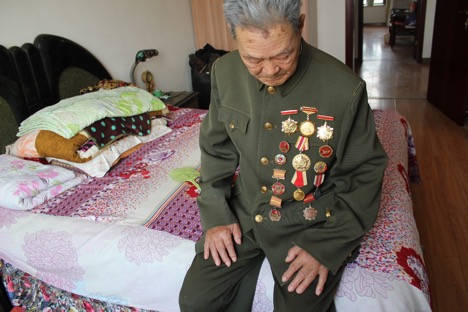
By Lucy Wang
[divider]
[dropcap]I[/dropcap] came to Shanghai to do research for my senior thesis on the role of art museums in Shanghai’s art world from an economic and political lens. Two weeks ago, I took a detour and went to visit my grandfather who lives in Hebei, a Chinese province that borders Beijing. He lives in a “small town” of two million people, along with both sides of my extended family. The infrastructure, sanitation, and activities to date are incomparably behind Shanghai’s, but nonetheless, there are many hidden gems, one of which is my grandpa.
He’s the town hero, a revered veteran and talented self-taught ambidextrous calligrapher. The town newspaper often does stories on his life as well as his calligraphy. My grandfather’s experiences encompass a great deal of modern Chinese history. He was born before China became the People’s Republic of China. He joined the army at 16, became an officer at 16, and led a group of 150 men to fight in the Second Sino-Japanese War as a general when he was 19. After defeating the Japanese, he stood at Tiananmen Square with Mao Zedong at the founding of the People’s Republic of China in 1949. He then fought in the Korean War (on the Chinese and North Korean side) as a general as well. He was jailed during the Cultural Revolution for treachery for the government. The treachery was that he pointed out the people were starving and the government perhaps might try to do more to help them. After spending a couple of years in prison, he was then sent to the countryside to feed pigs as a part of a re-education program. Eventually, in his 40s, he was pardoned and reinstated as a general and continues to receive a decent government pension to this day.
As tears streamed down my face at the recounting of his experiences during the Cultural Revolution and beyond, I began to understand the loneliness that he must hold in his heart. There’s so much I still don’t know about him. For starters, I don’t even know his name because he’s 87 years old and you never call an older person by their name, but only by your relationship to them. So he’s always just been grandpa (laoye) to me and dad to relatives in my parents’ generation. So I’ve never heard anyone call him by name. And if I don’t know his name and I’m his granddaughter, how much more of his life is hidden, lost, and forgotten?
But even more than that, I think about the loneliness in the things my grandpa has experiences. He had never known his parents—they died young because they were poor and couldn’t afford medicine after becoming ill. His older brother raised him, but all of his siblings have since passed away. All of his fellow soldiers were either persecuted or killed during the Cultural Revolution or have since passed away as well. The China of today—the China of maglev trains and internet shopping and children who will never learn about the full extent of the Cultural Revolution, for whom poverty and famine and war are but an abstract idea—was unimaginable for him when he sat in his prison cell for five years unable to take care of his children or his wife.
But my grandfather is not angry, at least not anymore. I suppose one cannot contain so much anger and live until the age of 87. He, however, remains deeply cynical and suspicious of the government. When I asked him what he thinks of the Chinese Communist Party, his response was a simple three words that revealed for just a second the depth of pain and betrayal that he experienced at their hands. He admits that his life turned out better than most. He survived. He has a pension. He has eight healthy grandchildren, one of whom is at Yale University. His daily life consists of reading the paper, taking two walks, and receiving visits from his family.
Nonetheless, I didn’t know how to process his history, which I suppose is my history. It was outside of my paradigm of the world, which hardly involved China at all as I have spent nearly all of my life in the US. I frantically scribble all I hear about my grandfather in my journal, I try to show him that I care, that his history is important, that he is important to me, but I can’t help but be confronted with the ephemeral nature of his stories and legacy. I can’t really understand any of his life on an emotional level. And if I have children in the future, their ties to China will be ever more tenuous than mine. And my grandfather will just be a myth for them, something that happened before their time, distilled into history lessons of a country that is not theirs. And that, I suppose, is the immigrant’s sacrifice.
Lucy Wang is a rising senior in Morse majoring in Ethics, Politics and Economics. Contact her at lucy.x.wang@yale.edu.